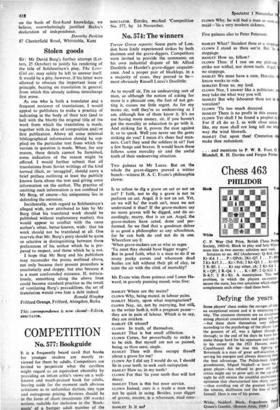COMPETITION
No. 577: Bookguide
It is a frequently heard cavil that books for younger readers are mostly re- viewed for them by adults. Competitors are invited to perpetrate what the cavillers might regard as an equivalent absurdity by providing an infant critic's views on a well- known and much-praised book for adults, leaving aside for the moment such obvious criticisms as to unfamiliar diction, tiny type and outrageous pricing. Reviews should be in the form of short (maximum 100 words) notices, suitable for inclusion in the 'Book- guide' of a bumper adult number of the SPECTATOR. Entries, marked 'Competition No. 577, by 14 November.
No. 574: The winners
Trevor Grove reports: Some parts of Lon- don have lately experienced strikes by both dustmen and the grave-diggers. Competitors were invited to provide the comments on his own industrial dispute of Mr Alfred Doolittle or Hamlet's grave-digger acquaint- ance. And a proper pair of blacklegs, in a a majority of cases, they proved to be— most obviously Russell Lucas's Doolittle: As to myself sir, I'm an undeserving sort of man, so although the notion of asking for more is a pleasant one, the fact of not get- ting it, causes me little regret. As for my mates sir, well they're as undeserving as I am, although few of them know it. It's no use having more money, sir, if you haven't got the morality or education to go with it. And striking for it, proves the case against it, so to speak. Well you never see the gents striking do you? I mean it's sheer bad man- ners. Can't they send the soldiers in sir? Just a few bangs and bravos. It would learn these fellows some morality sir and the awful truth of their undeserving situation.
Two guineas to Mr Lucas. But on the whole the grave-diggers proved a wittier bunch—witness H. A. C. Evans's philosophic clown: Is to refuse to dig a grave an act or not an act? I' faith, not to dig a grave is not to perform an act. Argal, it is not an act. Yet, an we will ha' the truth on't, must we not understand it thus? If the grave-makers say no more graves will be digged, and do ac- cordingly, marry, that is an act. Argal, the grave-makers have acted, done and per- formed. So we find that a goodman delver is as good a philosopher as any schoolman, for he can both do and not do in one. Wherefore say I: 'When grave-makers are as wise as sages 'Tis meet they should have bigger wages.' But in good faith, what is a man to do if so many pocky corses and whoreson dead bodies are left without their pit of clay, to taint the air with the stink of mortality?
Mr Evans wins three guineas and Lance Ha- ward, in gravely punning mood, wins five: HAMLET Where are thy mates?
CLOWN Why, being mated, in labour pains. HAMLET Marry, upon what impregnation? CLOWN Nay, sir, not by marrying, but still, as the writer hath it, with a pregnant pause— they are in pain of labour. Which is to say, they are stricken.
HAMLET Of whom?
CLOWN In truth, of themselves.
HAMLET That is but small affliction. cLowN Certes, for proverbially to strike is to be rich. But myself am not so pained, being, as thou seest, single.
HAMLET Then wilt thou occupy thyself about a grave for me?
cLowiv An I did say I would do so, I should lie in your teeth, to seek such occupation. HAMLET How so, in my teeth?
CLOWN For that your teeth that will last decay.
HAMLET Then is this but poor service. CLOWN Indeed, ours is a trade a man may not be quick in using. Besides, your digger of graves, master, is a whoreson, mad crea- ture.
HAMLET Is It sot anwN Why, he will bed a man as soon maid—'tis a very modern sickness.
Five guineas also to Peter Peterson: HAMLET What? Standest thou at a stoppa CLOWN I stand as thou see'st. But stoppage.
HAMLET How so, fellow?
CLOWN Thus: if I rest on my pick-axe, strike not withal, nor down tools. Argal, no stoppage.
HAMLET We must have a care, Horatio: knave works to rule.
HORA'TIO Even so, my lord.
CLOWN Nay, I answer like a politician: y may take me what way you will. HAMLET But why labourest thou not in vocation?
CLOWN 'Tis too much decayed. HAMLET There is no profit in this answer. CLOWN Yet shall I be found a prophet in For if all do as I, as with close union like, my nose shall ere long tell me whi way the wind bloweth.
HAMLET Out upon thee! Cremation s make thee redundant.
. . . and mentions to P. W. R. Foot, G. Blundell, R. H. Davies and Fergus Porter.














































 Previous page
Previous page